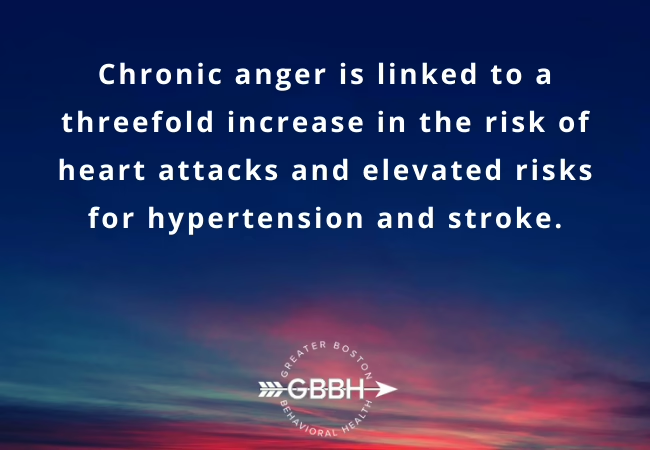Everyone experiences anger—it’s a normal emotional response to feeling threatened, frustrated, or hurt. However, when anger becomes frequent, intense, or difficult to control, it can cause significant damage to relationships, careers, health, and self-esteem. For some, unmanaged anger masks deeper emotional pain like trauma, anxiety, depression, or a lack of coping skills.
At Greater Boston Behavioral Health, we offer specialized Anger Management Therapy in Boston as part of our comprehensive Mental Health Programs in Boston. Whether anger has started disrupting your daily life, or you simply want to build healthier emotional patterns, anger management therapy can help you move from reaction to resilience.
In this blog, we’ll explore in-depth what anger management therapy is, how it works, who can benefit, and why seeking help is a courageous and transformative decision.
What Exactly Is Anger Management Therapy?
Anger management therapy is a specialized form of counseling aimed at helping individuals:
- Understand the roots of their anger (what triggers it and why)
- Recognize early warning signs of emotional escalation
- Develop healthier responses to frustration and stress
- Communicate feelings assertively without aggression
- Replace destructive patterns with coping strategies that lead to healthier relationships and inner peace
It is NOT about eliminating anger altogether. Anger, when managed correctly, can be constructive—it can motivate advocacy, inspire change, and strengthen boundaries. The goal is to transform anger from a destructive force into a productive one.
At Greater Boston Behavioral Health, anger management is integrated across treatment levels—from outpatient therapy to Partial Hospitalization Program in Boston (PHP), Intensive Outpatient Program in Boston (IOP), and Residential Treatment Program in Boston.
Techniques Used in Anger Management Therapy
Our clinicians employ several evidence-based methods to help clients address anger in meaningful ways:
- Cognitive Behavioral Therapy Boston (CBT): Identifying and challenging irrational, distorted thought patterns (“They disrespected me, so I have to yell”) and replacing them with balanced, rational responses.
- Dialectical Behavior Therapy in Boston (DBT): Teaching emotional regulation, distress tolerance, and interpersonal effectiveness skills to maintain control during emotional surges.
- Mindfulness-Based Stress Reduction (MBSR): Cultivating awareness of physical and emotional cues before anger escalates and developing skills to self-soothe.
- Role-Playing and Behavioral Rehearsal: Practicing assertive communication and de-escalation techniques in a safe, therapeutic environment.
- Psychoeducation: Helping clients understand the physiological effects of anger (like the “fight or flight” response) and how to manage their bodies’ stress responses effectively.
These techniques are personalized within individual therapy sessions, specialized group therapy tracks, and family therapy sessions when appropriate.
Common Root Causes of Uncontrolled Anger
To truly heal anger, it’s important to dig deeper into why it manifests in the first place. Some of the most common contributing factors include:
- Childhood trauma or neglect
- Unresolved grief or loss
- Chronic invalidation or emotional abuse
- Post-traumatic stress disorder (PTSD)
- Low frustration tolerance or poor impulse control
- Substance abuse and co-occurring disorders
- Social or financial stressors
- Cultural or societal influences on emotional expression
At Greater Boston Behavioral Health, we recognize that anger is often a symptom—not the root issue. Our programs offer comprehensive psychiatric care in Boston to assess and address any underlying conditions.
Who Should Consider Anger Management Therapy?
Anger management therapy is beneficial for a wide range of individuals, including:
Adults Experiencing Chronic Irritability or Rage
Professionals who lose control in high-stress environments, parents who feel overwhelmed, or anyone struggling with frequent arguments or hostility.
Adolescents and Young Adults
Teens facing academic pressure, bullying, identity struggles, or early trauma often express pain through anger. Therapy teaches them healthier emotional outlets.
Individuals Facing Legal or Workplace Consequences
Court-mandated anger management following assaults, domestic violence incidents, road rage, or workplace conflicts.
Trauma Survivors
Those who have survived violence, abuse, or intense loss often carry unresolved anger that impacts every area of life.
People Managing Co-Occurring Disorders
Clients battling depression, anxiety, substance use, or borderline personality traits often experience emotional dysregulation that includes anger.
What to Expect in an Anger Management Therapy Program at Greater Boston Behavioral Health
A typical anger management treatment plan might include:
Comprehensive Assessment
A clinical intake evaluation assesses:
- History of anger episodes
- Underlying mental health issues
- Relationship and work impact
- Risk factors for escalation
Individual Therapy
Tailored sessions focusing on:
- Identifying triggers
- Developing personalized de-escalation techniques
- Strengthening cognitive reframing skills
Group Therapy (Optional or Integrated)
Skills-based anger management groups teach:
- Real-time communication practice
- Peer support and feedback
- Relapse prevention planning
Psychiatric Care (If Needed)
Access to psychiatrists for:
- Diagnosing co-occurring mental health conditions
- Medication evaluation to manage mood instability, impulsivity, or underlying depression/anxiety
Our integrated approach ensures clients receive whole-person care, not just symptom management.
When Structured Programs (IOP, PHP, or Residential) Are Needed
Anger management issues may require a higher level of care when:
- Daily functioning is impaired
- Relationships are breaking down due to aggression
- There’s a history of violence or legal consequences
- Previous outpatient therapy has failed to produce significant change
- Anger coexists with severe anxiety, depression, substance use, or trauma
In these cases, enrolling in an Intensive Outpatient Program in Boston (IOP), Partial Hospitalization Program in Boston (PHP), or even an Inpatient Treatment Program in Boston can provide the structure, accountability, and intensity needed for deeper healing.
Why Choose Greater Boston Behavioral Health for Anger Management Therapy?
At Greater Boston Behavioral Health, we’re committed to helping individuals move beyond anger and into empowerment.
We offer:
- Tailored anger management treatment plans integrated into all levels of care
- Licensed experts in CBT, DBT, trauma therapy, and anger-focused interventions
- Seamless access to psychiatric evaluations and medication management
- Trauma-informed, culturally sensitive, and LGBTQIA+ affirming care
- Continuum of care from outpatient to inpatient, ensuring long-term support and relapse prevention
No matter where you’re starting from, we believe that every person can learn to manage their emotions, rebuild their relationships, and regain their self-respect.
Conclusion
Anger doesn’t have to define your life. With the right guidance, tools, and compassionate support, it can become a powerful catalyst for emotional strength, healthier relationships, and personal transformation.
If you’re ready to regain control, reconnect with your values, and express yourself in healthier ways, Greater Boston Behavioral Health is here to help. Call (888) 278-0716 today to learn more about our anger management therapy programs—and take your first courageous step toward lasting change.
FAQ on Anger Management Therapy
What is anger management therapy?
Anger management therapy helps individuals identify triggers, develop coping skills, and express emotions constructively through evidence-based therapeutic techniques.
Who should seek anger management therapy?
Anyone experiencing frequent irritability, explosive anger, relationship conflicts, workplace issues, legal trouble, or emotional distress linked to anger can benefit.
What therapies are used in anger management at Greater Boston Behavioral Health?
We use Cognitive Behavioral Therapy (CBT), Dialectical Behavior Therapy (DBT), mindfulness practices, trauma therapy, and psychoeducation to manage and transform anger.
Is group therapy part of anger management treatment?
Yes. In addition to individual therapy, many clients benefit from anger management groups where they can learn and practice emotional regulation skills in a supportive environment.
Can anger management therapy be part of IOP or PHP?
Absolutely. Anger management is integrated into Intensive Outpatient Programs (IOP) and Partial Hospitalization Programs (PHP) at Greater Boston Behavioral Health for clients needing structured daily support.


